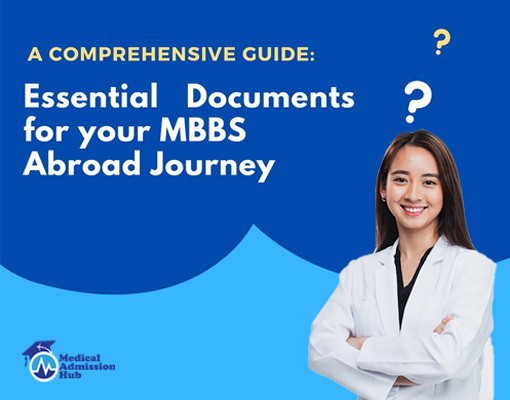Essential Documents for Your MBBS Abroad Journey: A Comprehensive Guide
The pursuit of a medical degree is an ambition cherished by many young minds. While studying MBBS in one’s home country may seem like the obvious choice, an increasing number of students are investigating the possibility of studying MBBS abroad. If you are planning to decide to study MBBS abroad, there are a few things that you should know about. Studying MBBS abroad involves careful planning and preparation. Carrying the right documents with you is crucial to ensure a smooth transition and enrollment process. Not sure what all documents to take with you? Don’t worry, we’ve got you covered! We’ve curated this blog on the important documents to carry while studying MBBS abroad for Indian students.
Before we get into that, let’s explore the reasons why studying MBBS abroad can be a compelling and rewarding decision for aspiring medical professionals.
Why study MBBS abroad?
1. World-Class Education and Infrastructure
Many countries that offer MBBS programs abroad are home to renowned universities and medical institutions with a strong emphasis on research and practical training. These institutions have cutting-edge facilities, state-of-the-art laboratories, and access to advanced medical technology. Studying in such an environment provides students with a unique opportunity to learn from leading medical experts and gain exposure to diverse medical practices, setting a solid foundation for their medical careers.
2. High-Quality Medical Curriculum
International medical schools often follow globally recognized and standardized medical curricula, such as the World Health Organization (WHO) guidelines. These programs are designed to ensure that medical graduates possess the necessary knowledge and skills to meet international standards in the medical field. As a result, studying MBBS abroad equips students with a comprehensive understanding of medical sciences and clinical practices, preparing them for a successful medical career anywhere in the world.
3. Multicultural Experience and Global Exposure
Studying MBBS abroad is not just about academics; it is also an enriching cultural experience. Interacting with peers from diverse backgrounds and different parts of the world fosters cultural sensitivity, adaptability, and communication skills. Exposure to various healthcare systems and patient demographics enhances a student’s ability to handle unique medical challenges and develop a holistic approach to patient care. Additionally, the experience of living in a foreign country can be personally transformative, broadening one’s horizons and building resilience.
4. Affordability and Financial Benefits:
Wondering if there are options for studying MBBS in abroad for Indian students at low cost? For many aspiring doctors, studying MBBS abroad can be a cost-effective option. Some countries offer subsidized or comparatively lower tuition fees for international students. Additionally, living costs and accommodation may also be more affordable in certain regions, reducing the overall financial burden. Moreover, almost all countries allow students to work part-time while studying, providing an opportunity to earn and gain practical experience simultaneously.
5. Merit-Based Admissions and Limited Entrance Barriers
Several foreign universities offering MBBS programs admit students based on their academic merit rather than just a competitive entrance exam. This offers a fair chance to talented students who may not have excelled in standardized tests but possess the aptitude and passion for medicine. Additionally, some countries have lower entry requirements, making it more accessible for international students to secure admission into medical schools abroad.
Now that we’ve talked about the benefits of pursuing MBBs abroad, let’s dive into the details of the documents that you should carry with you once you’ve earned your ticket to an MBBs program abroad. As one of the top study abroad consultants in Kochi, we’re here to guide you.
- Passport: Your valid passport is the most critical document when traveling internationally. Make sure your passport has sufficient validity (at least one year) from the date of your departure and contains enough blank pages for visa stamps and other official endorsements.
- Visa Documents: This includes all the necessary documents required to obtain a student visa for your chosen country. Visa requirements vary depending on the country of study, but common documents include a valid passport, an admission letter from the university, proof of financial support, health insurance, and visa application forms.
- Admission Letter and Acceptance Documents: Carry the original admission letter and any other acceptance documents provided by the foreign university or college where you have been accepted to study MBBS.
- Academic Certificates and Transcripts: Carry all your academic certificates, mark sheets, and transcripts, including high school and any pre-medical course certificates that were required for admission to the MBBS program.
- Language Proficiency Certificates: If the medium of instruction at the university is different from your native language, you may need to provide language proficiency certificates. However, some countries do not demand the same for MBBS courses.
- Financial Documents: Provide proof of sufficient funds to cover your tuition fees, living expenses, and other related costs while studying abroad. This may include bank statements, sponsorship letters, or scholarship award letters.
- Health and Medical Records: Carry your medical records, vaccination certificates, and any other relevant health-related documents. Some countries may require specific vaccinations for international students.
- Passport-sized Photographs: Carry multiple passport-sized photographs, as they are often required for official documents, identification cards, and various other university processes.
- Travel Insurance: Obtain comprehensive travel insurance coverage to protect yourself against any unforeseen medical or travel-related emergencies.
- Power of Attorney (if applicable): It’s a good idea to carry a power of attorney document that authorizes a family member or trusted individual to act on your behalf in specific situations, such as handling legal matters or financial transactions back home.
- Emergency Contact Information: Keep a list of emergency contact numbers, including your country’s embassy or consulate in the destination country, as well as your family’s contact details.
- Residence Permit (if applicable): Depending on the country you’re studying in, you might need to apply for a residence permit after arrival. Carry any documents related to the residence permit application process.
Remember that the specific document requirements may vary based on the country and university you plan to study at. It is essential to research and contact the respective embassy or consulate of the destination country to get accurate and up-to-date information regarding the necessary documents for studying abroad. However, you don’t have to do it all by yourself. As one of the best and most reliable MBBS abroad consultants in Delhi, we can help you. Get in touch with us today!


